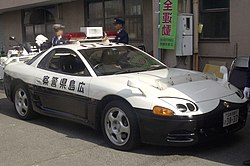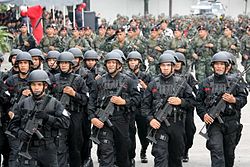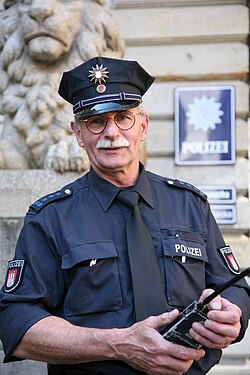This article needs additional citations for verification .(September 2017) |
A law enforcement agency (LEA) is any agency which enforces the law. This may be a special or local police/sheriffs, state troopers, and federal police such as the Federal Bureau of Investigation (FBI) or the United States Marshals (USMS). Also, it can be used to describe an international organization such as Europol or Interpol. This is a list of law enforcement agencies, organized by continent and then by country.
Contents
- International
- Africa
- Algeria
- Angola
- Benin
- Botswana
- Burkina Faso
- Burundi
- Cameroon
- Cape Verde
- Central African Republic
- Chad
- Comoros
- Democratic Republic of the Congo
- Republic of the Congo
- Côte d'Ivoire
- Djibouti
- Egypt
- Equatorial Guinea
- Eritrea
- Ethiopia
- Gabon
- Gambia
- Ghana
- Guinea
- Guinea-Bissau
- Kenya
- Lesotho
- Liberia
- Libya
- Madagascar
- Malawi
- Mali
- Mauritania
- Mauritius
- Morocco
- Mozambique
- Namibia
- Niger
- Nigeria
- Rwanda
- Sahrawi Arab Democratic Republic
- São Tomé and Príncipe
- Senegal
- Seychelles
- Sierra Leone
- Somalia
- South Africa
- South Sudan
- Sudan
- Eswatini
- Tanzania
- Togo
- Tunisia
- Uganda
- Zambia
- Zimbabwe
- Asia
- Afghanistan
- Bahrain
- Bangladesh
- Bhutan
- Brunei
- Cambodia
- People's Republic of China
- Republic of China (Taiwan)
- India
- Indonesia
- Iran
- Iraq
- Israel
- Japan
- Jordan
- Kazakhstan
- Democratic People's Republic of Korea (North Korea)
- Republic of Korea (South Korea)
- Kuwait
- Kyrgyzstan
- Laos
- Lebanon
- Malaysia
- Maldives
- Mongolia
- Myanmar
- Nepal
- Oman
- Pakistan
- Palestine
- Philippines
- Qatar
- Saudi Arabia
- Singapore
- Sri Lanka
- Syria
- Tajikistan
- Thailand
- East Timor
- Turkmenistan
- United Arab Emirates
- Uzbekistan
- Vietnam
- Yemen
- Europe
- Albania
- Andorra
- Armenia
- Austria
- Azerbaijan
- Bailiwick of Guernsey
- Bailiwick of Jersey
- Belarus
- Belgium
- Bosnia and Herzegovina
- Bulgaria
- Croatia
- Cyprus
- Czech Republic
- Denmark
- Estonia
- Finland
- France
- Georgia
- Germany
- Greece
- Hungary
- Iceland
- Ireland
- Isle of Man
- Italy
- Kosovo
- Latvia
- Lichtenstein
- Lithuania
- Luxembourg
- Malta
- Moldova
- Monaco
- Montenegro
- The Netherlands
- North Macedonia
- Norway
- Poland
- Portugal
- Romania
- Russia
- San Marino
- Serbia
- Slovakia
- Slovenia
- Spain
- Sweden
- Switzerland
- Türkiye
- Ukraine
- United Kingdom
- Vatican
- North America
- Antigua and Barbuda
- Bahamas
- Barbados
- Belize
- Bermuda
- Canada
- Costa Rica
- Cuba
- Dominica, Commonwealth of
- Dominican Republic
- El Salvador
- Grenada
- Guatemala
- Haiti
- Honduras
- Jamaica
- Mexico
- Nicaragua
- Panama
- Saint Kitts and Nevis
- Saint Lucia
- Saint Vincent and the Grenadines
- Trinidad and Tobago
- United States
- Oceania
- Australia
- Fiji
- Kiribati
- Marshall Islands
- Federated States of Micronesia
- Nauru
- New Zealand
- Palau
- Papua New Guinea
- Pitcairn Islands
- Samoa
- Solomon Islands
- Tonga
- Tuvalu
- Vanuatu
- South America
- Argentina
- Bolivia
- Brazil
- Chile
- Colombia
- Ecuador
- Guyana
- Panama 2
- Paraguay
- Peru
- Suriname
- Uruguay
- Venezuela
- Disbanded agencies
- Austria 2
- Costa Rica 2
- Czechoslovakia
- Germany 2
- Fascist Italy
- Empire of Japan
- Panama Canal Zone
- Second Polish Republic
- People's Republic of Poland
- Philippines 2
- Communist Romania
- Former Soviet Union/Russia
- South Vietnam
- See also
- References
International – Africa – Asia – Europe – North America – Oceania – South America – Disbanded |






























